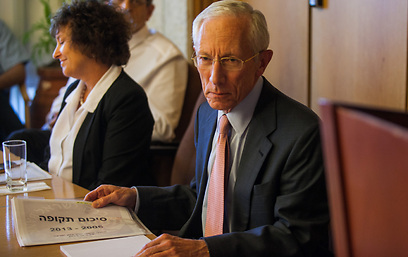
Fischer: BOI head not as important as before
In press conference ahead of end of his term, outgoing Bank of Israel governor reviews condition of Israeli economy in past eight years, stresses its strength compared to Western economies
Bank of Israel Governor Prof. Stanley Fischer held a press conference Tuesday ahead of the end of his term next week. His deputy, Dr. Karnit Flug, will replace him for several weeks until the new governor, Prof. Jacob Frenkel, takes office.
Fischer elaborated on the central bank's achievements in the past eight years, including the enactment of the Bank of Israel Law and the establishment of the bank's Monetary Committee and Supervisory Council.
"Anyone sitting in the Monetary Committee's meetings understands that the quality of discussions has changed," he said. "It's slightly problematic that I am still reading about Fischer's decisions. I still make decisions, but the decisions today belong to the Monetary Committee.
"I'm glad to say that I am certain I am leaving the bank in very good hands. I will be the last to say that the governor is not important. But the governor is not as important as in previous years," he added.

Stanley Fischer and Karnit Flug (Photo: Ohad Zwigenberg)
Fischer went on to review the condition of the Israeli economy, noting its strength compared to Western countries' economies.
According to the outgoing central bank governor, "The great success of the policy was that the public's inflation expectations for the next 10 years were almost always within the target (1-3%). This means that the public in Israel believes that the government and the Bank of Israel will succeed in maintaining the inflation in the next 10 years.
"It's important because the moment the public believes that we will maintain the money's value, it can sign long-term contracts. Eight years ago, almost all housing contracts, rent and apartment purchases, were in US dollars. Today it's in shekels. And that's good, because the shekel is our currency."
Housing crisis
Addressing the situation of the real estate market, Fischer said: "We have a problem dealing with housing. Clearly, a low interest rate positively affects demands. You don't lower interest when you fear it will harm exports. Had we dealt with housing through the interest rate we would have caused an appreciation of the shekel and higher unemployment.
"So what should be done? Even when you succeed in increasing supplies, you reduce prices. So had we been able to bring about an increase in supplies, we could have lowered the price and expanded construction.
"Land marketing must be boosted. Construction length must be dealt with. It takes 13 years from the moment there is a decision to build till apartments arrive. It's hard to imagine, but that's the situation. Part of the delay is in the preparation of the land and part of it is in granting building permits."
Fischer also reviewed the Bank of Israel's activity in regards to banks. "Bank commissions are decreasing every year," he said. "In 2008 the commissions stood at NIS 20 (about $5.5) on average, and today they are NIS 14 ($3.8) and are still dropping.
"The supervisor of banks announced today that he will demand that the banks give all customers the option to choose between accounts as they are run today and accounts at a fixed price which provide basic or extended services. There is a constant effort to reduce commissions, but we won't do it at the expense of the banks' stability."










